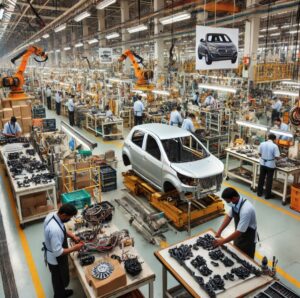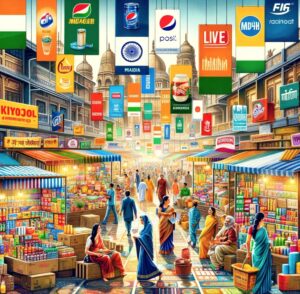Schaeffler
Business Model and Segments: Schaeffler, a German automotive and industrial supplier, operates through three main segments: Automotive OEM, Automotive Aftermarket, and Industrial. The company focuses on innovation and technology-driven solutions in powertrain and chassis systems.
Future Strategies: Schaeffler’s strategy emphasizes electrification, digitalization, and sustainability. Investments in electric mobility, smart manufacturing, and renewable energy solutions are central to their growth plans.
Strengths and Weaknesses: Strengths:
- Strong R&D capabilities
- Extensive global footprint
- Diverse product portfolio
Weaknesses:
- High dependency on the automotive sector
- Exposure to economic cycles
Financial Performance: As of 2023, Schaeffler reported robust financial performance, driven by increased demand in electric vehicles and industrial automation. The company’s revenue was approximately €15 billion, with steady profitability.
Gabriel India
Business Model and Segments: Gabriel India, a key player in the Indian automotive industry, specializes in manufacturing shock absorbers, struts, and front forks for two-wheelers, passenger cars, and commercial vehicles.
Future Strategies: Gabriel aims to expand its product portfolio and enhance its R&D capabilities. The company is focusing on capturing more market share in the electric vehicle (EV) segment and strengthening its export business.
Strengths and Weaknesses: Strengths:
- Market leader in the Indian shock absorber segment
- Strong relationships with major OEMs
- Expanding export presence
Weaknesses:
- Limited diversification beyond shock absorbers
- Vulnerability to fluctuations in raw material prices
Financial Performance: In 2023, Gabriel India recorded a revenue of ₹2,000 crore, with consistent growth driven by strong domestic demand and increasing exports.
Bharat Forge
Business Model and Segments: Bharat Forge, a flagship company of the Kalyani Group, is a global leader in metal forging. It serves automotive, aerospace, oil & gas, and industrial sectors, providing a wide range of forged and machined components.
Future Strategies: Bharat Forge is diversifying into non-automotive segments such as defense and renewable energy. The company is investing in advanced manufacturing technologies and increasing its focus on sustainability.
Strengths and Weaknesses: Strengths:
- Leading global forging capacity
- Strong presence in diversified industries
- Robust technological capabilities
Weaknesses:
- High capital expenditure requirements
- Exposure to cyclical industries
Financial Performance: For the fiscal year 2023, Bharat Forge reported revenues of ₹12,000 crore, driven by strong growth in its non-automotive segments and international markets.
Kalyani Group
Business Model and Segments: Kalyani Group, a diversified industrial conglomerate, has a significant presence in engineering steel, automotive, industrial, and renewable energy sectors. Bharat Forge is its flagship company.
Future Strategies: The Group is focusing on expanding its renewable energy portfolio and enhancing its capabilities in the defense sector. Investments in digital transformation and sustainable practices are also key strategic priorities.
Strengths and Weaknesses: Strengths:
- Diversified business portfolio
- Strong global presence
- Leadership in the forging industry
Weaknesses:
- High dependency on the automotive sector
- Exposure to global economic volatility
Financial Performance: The Kalyani Group’s combined revenue for 2023 stood at approximately ₹25,000 crore, with significant contributions from its automotive and industrial businesses.
Remsons Industries
Business Model and Segments: Remsons Industries is a manufacturer of automotive control cables, gear shifters, and pedal assemblies. The company serves both domestic and international markets, supplying to major OEMs.
Future Strategies: Remsons is focusing on expanding its product range and enhancing its technological capabilities. The company aims to increase its footprint in the EV segment and improve its operational efficiencies.
Strengths and Weaknesses: Strengths:
- Strong product focus in control cables
- Established relationships with OEMs
- Growing international presence
Weaknesses:
- Limited product diversification
- Competition from larger players
Financial Performance: Remsons reported a revenue of ₹500 crore in 2023, with growth driven by increased demand for automotive components in both domestic and international markets.
Comparative Analysis
Market Position:
- Schaeffler stands out as a global leader with a diversified portfolio and strong R&D capabilities.
- Gabriel India is a dominant player in the Indian shock absorber market with a growing export business.
- Bharat Forge is a global leader in forging with a strong presence in multiple sectors.
- Kalyani Group benefits from its diversified portfolio and leadership in engineering steel and forging.
- Remsons focuses on niche automotive components with a growing international presence.
Strategic Focus:
- Schaeffler and Bharat Forge are heavily investing in digitalization and sustainable practices.
- Gabriel India and Remsons are focusing on expanding their product ranges and technological capabilities.
- Kalyani Group is diversifying into renewable energy and defense sectors.
Financial Health:
- Schaeffler and Bharat Forge exhibit robust financial performance with significant revenue figures.
- Gabriel India and Kalyani Group show steady growth with strong market positions in their respective segments.
- Remsons, though smaller in revenue, is experiencing growth through increased demand and international expansion.




